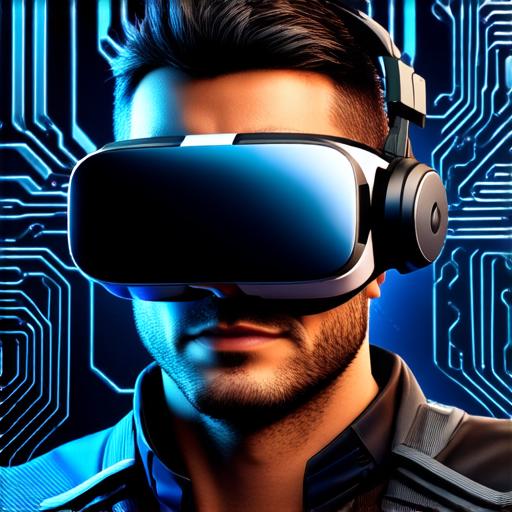
1. Understanding the basics of VR app development
Before we dive into best practices and case studies, it’s important to understand the fundamentals of VR app development. Virtual Reality technology is based on immersing users in a simulated environment that they can interact with using specialized devices such as headsets and hand-held controllers.
One of the key components of VR app development is Unity, which is a popular game engine that has been adapted for VR use. Unity provides developers with a range of tools and assets that make it easier to create virtual worlds and experiences. Other popular VR development tools include Unreal Engine and A-Frame.
2. Best practices for VR app development
There are several best practices that developers should follow when creating VR apps to ensure success. These include:
- Keeping the user experience at the forefront: VR apps must be designed with the user in mind. This means creating an intuitive and engaging interface that allows users to easily navigate through the virtual world.
- Optimizing for hardware limitations: VR apps must be optimized for the hardware they will run on. This includes minimizing graphical requirements, reducing load times, and ensuring compatibility with different devices.
- Testing and debugging extensively: VR app development requires extensive testing and debugging to ensure that the app is functioning correctly and providing an enjoyable user experience.
- Incorporating motion sickness prevention techniques: Motion sickness is a common issue for VR users, so it’s important to incorporate techniques such as smooth movements and minimal jarring to prevent this from happening.
- Creating content that is optimized for the medium: VR apps must be designed with the unique characteristics of virtual reality in mind. This includes creating content that is optimized for the limited field of view, immersive nature of the platform, and the fact that users will be experiencing motion sickness.
3. Case studies in VR app development
One of the best ways to learn about VR app development is by studying successful case studies. Here are a few examples:
- Google Expeditions: Google’s virtual reality app, Expeditions, allows users to explore the world from anywhere in the world using their smartphones or VR devices. The app has been downloaded over 10 million times and has received positive reviews for its immersive nature and educational content.
- Pokemon Go: Another successful example of VR app development is Pokemon Go, which uses augmented reality to bring the popular game to life in the real world. The app has been downloaded over 50 million times and has generated significant revenue for its developers.
- The New York Times VR app: The New York Times’ virtual reality app provides users with a range of immersive journalism experiences, including virtual tours of newsrooms and coverage of major events such as the presidential inauguration. The app has been downloaded over 2 million times and has received critical acclaim for its innovative use of VR technology.
4. Expert opinions on VR app development
To gain a deeper understanding of VR app development, it’s important to hear from experts in the field. Here are a few insights:
- “VR is not just about the technology; it’s about the experience.” – Omar Sy, CEO of Ubisoft VR
- “Creating VR experiences requires a new set of skills and techniques that are different from those used in traditional game development.” – Chris Madsen, Unity Technologies
- “The most successful VR apps will be those that create a truly immersive experience that transports users into another world.” – David Hellyard, CEO of Vertigo Software
5. Real-life examples to illustrate the points being made
To help illustrate the concepts discussed in this article, let’s take a look at some real-life examples:
- A user experiencing motion sickness while playing a VR game due to sudden movements and jarring.
- A user navigating through a virtual world with an intuitive interface that allows them to easily explore and interact with the environment.
- A developer optimizing a VR app for different hardware devices, such as smartphones versus high-end VR headsets.
- An expert in the field discussing the importance of creating content that is optimized for virtual reality and the unique characteristics of the medium.
6. Frequently Asked Questions (FAQs)
Here are some frequently asked questions about VR app development:
- What software do I need to create a VR app? There are several software options available, including Unity, Unreal Engine, and A-Frame.
- How long does it take to develop a VR app? The time required to develop a VR app can vary greatly depending on the complexity of the project, but it typically takes several months to complete.
- What are some common issues with VR development? Motion sickness, hardware limitations, and user experience design are some of the common issues that developers face when creating VR apps.
- How can I ensure my VR app is optimized for different devices? Developers should test their app on different devices and make adjustments as necessary to ensure compatibility and smooth performance.
- Can I monetize my VR app? Yes, there are several ways to monetize a VR app, including in-app purchases, advertising, and subscription-based models.
Conclusion
Virtual reality technology is constantly evolving, and VR app development is following suit. By understanding the basics of VR app development, following best practices, and studying successful case studies, developers can create immersive experiences that engage users and generate revenue. However, it’s important to keep in mind some of the challenges associated with VR development, such as motion sickness, hardware limitations, and user experience design. With the right approach and tools, however, anyone can create a successful VR app.
